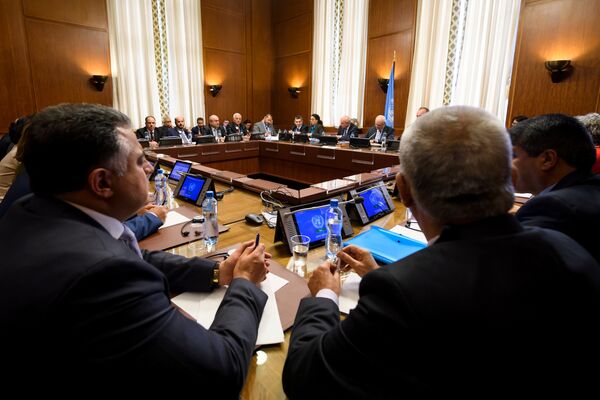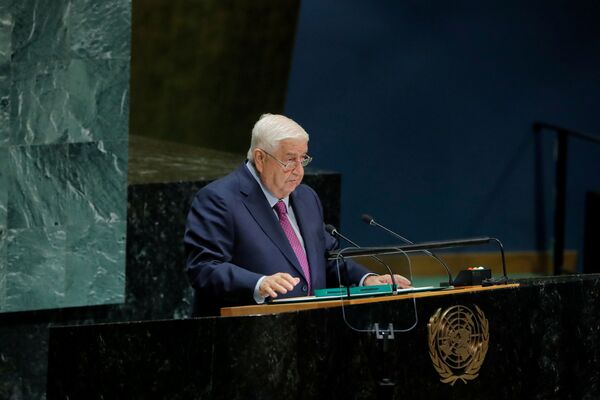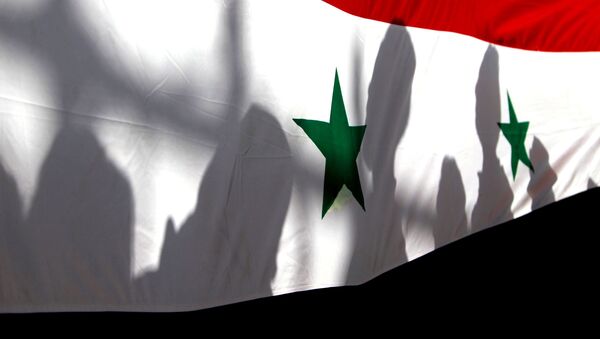Speaking on the sidelines of the UN General Assembly in New York, United Nations Special Envoy for Syria Geir Pedersen shared his first-hand knowledge and the details of the upcoming meeting of the Syrian Constitutional Committee.
Sputnik: What’s the agenda of the first meeting?
Geir Pedersen: That will be decided by the Syrians themselves. So I will have meetings with the two co-chairs. And there will be one chair from the government and then from the opposition. So, I have now agreed with Foreign Minister Muallem and with the leader of the opposition Hariri that we will sit down. And we'll first discuss with the chair from the government, then from the opposition, and then we’ll see how we move forward, but of course, what we want to achieve from the first meeting is that it sets a good example for rest of the deliberations of the committee. So, we’ll be discussing this very carefully.
Sputnik: When will you have the meetings with the chairs?
Geir Pedersen: Soon. No dates. No dates.
Sputnik: Will you reveal the names of the chairs?
Geir Pedersen: Yes, we will. I am not sure I will be able to do it on Monday, but very soon.
Sputnik: Are they confirmed already?
Geir Pedersen: I’ve heard different names, so I think we are in the process of finalising this.
Sputnik: Will there be any observer states on the committee?
Geir Pedersen: I think on the committee itself there will be no observer states. Because this is really about the Syrians themselves: that they have to develop a constitution that meets the aspirations of the Syrian people, so there is no role for observer status to be there during that period. But what is important, of course, is that we will have international support for the work of the committee. And there are different ways we are doing this. I am currently discussing this both with the government and with the opposition. I am discussing it, of course, also with our friends within the Astana format; you know this is just the beginning. We need to make sure that we can continue this in a very constructive manner.
Sputnik: So, you will be the main observer of how this works?
Geir Pedersen: So, you know, in the rules of the procedure, we have agreed with the government and with the opposition that it’s the role of the UN to be the facilitator of the process. So, we will have to facilitate. And that’s the only thing. No one else will have that role to play.
Sputnik: Who is already invited to the first meeting? Have you invited Astana?
Geir Pedersen: No, we have not invited anyone yet. So, this is also something I will have to discuss with the government and with the opposition. And then, I will also have to discuss it with Astana and also members of the so-called Small Group. It may be that we’ll have some international presence before or at the first meeting but it also may be that we will not have it. I don’t know yet.
Sputnik: Have you seen the statement by the US on the chemical attack?
Geir Pedersen: Frankly speaking, I have not been reading it, but I’ve been told about it.
Sputnik: Do you think it may have any impact on the work of the committee?
Geir Pedersen: I think we have to be very careful to mix other issues with the committee. We now have an agreement on the committee and the committee should come up and start working by the end of October. We should not make conditions, whatever happens in other places. We need to sit down, and to discuss and move forward and use this as an opportunity to open up and roll on the political process in Syria.
Sputnik: Will you discuss this statement with the US side? Their findings?
Geir Pedersen: In the UN, as you know, there is a separate organisation working on chemical attacks. So they will [provide] the natural redress for this. I am not an expert on chemical attacks.
Sputnik: Will you discuss the Constitution with the US before convening?
Geir Pedersen: I have already. As you know, the so-called Small Group came to see me in Geneva, I think, a couple of weeks ago. So, I’m also having a good dialogue with them and I saw them here in New York. The good news is that we now have an international consensus when it comes to the constitutional committee, so it’s supported by all members of the (UN) Security Council, it’s supported by the Astana and it’s supported by the Small Group.

And also when I’ve had bilaterals here during this week, both with the Astana three and the members of the small group, they all have been very clear that they support the launching of the Constitutional Committee.
Sputnik: The decisions in the CC require the approval by popular referendum or by the parliament?
Geir Pedersen: You know, two aspects of this: so, first and foremost, we will have the committee itself to agree on whatever is going to come out of the committee. And then that the verdict is that this will then be for popular approval as rightly mentioned. What that actually means, we will have to discuss when we have the agreement.
Sputnik: In your statement, you said that either the 2012 constitution will be amended or an absolutely new document will be created. What will be the goal - to have a new constitution or an old one amended?
Geir Pedersen: So, the exact voting is that you know the 2012 constitution and older Syrian constitutional experiences. And then, as it rightly said, amend or adopt a new constitution. There is, you know, sometimes amend is also enough to have a new constitution. But luckily enough, it’s not up to me to decide; this is up to the members of the committee, the Syrians themselves, they’ll have to make this decision. And I, as the United Nations, my role is to help to facilitate and to help the committee to move forward, but this is really a Syrian decision when they want to move forward on this.
Sputnik: Do you set any time frames when the constitution will be ready or when do you plan to hold elections? Are there any time frames?
Geir Pedersen: Yes. What is important is that we have an agreement, you know, with the government and with the opposition that we will have a commitment to work seriously on moving forward within the constitutional committee and to start addressing the important issues. And then, this will take on a life of its own, and, as I said, it will have to be up to our Syrian friends how they’re moving forward within the constitutional committee. We have an agreement also in the rules of procedure that I will then be reporting on the progress of the committee, and that I will do so on a regular basis.
Sputnik: How often will the CC meet?
Geir Pedersen: That’s a good question, but we will see. You know, first, we will have a meeting of the 150, then followed by a meeting of the 45 who will do the drafting of the committee. So, then, there is a question, you know, [as to] how long the 45 will sit down and meet, and how often they'll meet, but these are the topics we will have to get back to after we will have the first meeting, I believe.
Sputnik: Will the meetings always be in Geneva?
Geir Pedersen: Always is a very strong term, but you know, obviously, we will start in Geneva and then we will see how it develops, yes.
Sputnik: In case of a deadlock, a 50/50 vote, what would be the way to resolve this?
Geir Pedersen: Then we have no agreement. As you know, there is a focus in the rules of procedure that we should have a consensus. If there is not a consensus, that this I think we all hope we should be able to achieve, there is a voting threshold of 75 percent. So this means that 113 members of the committee will have to agree.
Sputnik: How many Kurds are there in the CC?
Geir Pedersen: I will not identify the members of the committee according to their ethnic belonging, so that’s just to say that there are also Kurdish members in the committee. I think we have succeeded in bringing together a broad range of all different communities in Syria and different opinions in the Syrian society so that we will have, you know, a credible and balanced committee that have the necessary legitimacy to develop the credible outcome of the discussions.
Sputnik: How many people from the Northeast are there?
Geir Pedersen: As I said, I will not get into these kinds of discussions.
Sputnik: You mention you heard there are two YPG members...
Geir Pedersen: I will not get into the different details of who is who in the committee.
Sputnik: On Astana, do you think this format remains relevant and important amid the foreign constitutional committee?
Geir Pedersen: I've said in the beginning that I hope that we will be able to bridge the differences [among] the Syrians and bring the Syrian parties together and there's also been a division within the international community and we should also aim to bridge their differences because I believe when it comes to Syria, generally I believe that there is a common international interest.

We have an interest in fighting terrorism, we have a common interest in achieving stability in Syria and we have an interest through that, if we want stability, we need to see a political process, build trust and bring Syria back to, not back to, but sort of can achieve what is a stable Syria. On this I believe there is an international consensus so if the Astana wants to continue meeting within the Astana format, by all means. If the small group wants to continue meeting on the small group format, by all means. It's their decision, not my decision, but what I hope we can see is a better cooperation between the Astana format and the small group.
Sputnik: Turkey recently said that they may begin a new operation in northeast Syria if the US doesn't make progress on safe zones, have you had any discussions on this and what are your concerns?
Geir Pedersen: In telling the Security Council, I'm very concerned by the fact that we have five different armies operating in Syria and this is obviously a threat to Syria's sovereignty, independence and territorial integrity, but it also affects regional stability. So I think the way out of this is to concentrate on finding a political solution, to have a nation-wide ceasefire, that we have calm in Idlib, stabilise the situation in the northeast and concentrate all our effort on moving forward on the political process. I think that's the only way forward to make sure that this does not lead to new confrontations [or] new developments that no one really wants to see happen.
Sputnik: What's your position on Turkey safe zones?
Geir Pedersen: The position of the Secretary-General is the following, that is: one, we need to respect Syria's sovereignty and as I said already territorial integrity and independence; and then the legitimate security concerns of Turkey needs to be taken into account; and then we need also to see, and that's point number three, that the interest of all of the communities in this area is respected.
Sputnik: Are there any discussions in the CC about autonomous areas, like the Kurdish autonomy?
Geir Pedersen: Again, this is up to the Syrians, you know, I will not be setting an agenda for what the Syrian parties should discuss. What we have agreed upon, is, you know, as you know, is this the so-called 12 principles. We form sort of a basis for the discussion, but as you know, this is something that two sides have agreed upon already.
Sputnik: How will you make sure that the committee works only on the constitution and not on other issues?
Geir Pedersen: I am confident that you know, when 150 people meet with this huge responsibility, in the situation as it is in Syria today, that they will come with all the responsibilities there and that they will live up to that responsibility and meet the aspirations of the Syrian people. So I am optimistic about this.
Sputnik: What is your comment on Muallem's speech today, where he called on foreign forces to leave the country?
Geir Pedersen: As I said already, I think it’s the ambition of all of us that international armies that are there - that it should not be necessary for them to be there anymore.

So we need to concentrate on the political track, and, of course, that we should end up in a situation where the Syrian government is in charge of all its own territory, absolutely.
Sputnik: So, you don’t see the need for international armies there now?
Geir Pedersen: As I said, what is important is that we are entering into a situation where whatever reasons for different armies have to be there is sorted out because we have a political deal that makes it possible (to say that this is no longer necessary).
Sputnik: Have you decided anything on your visit to Moscow?
Geir Pedersen: No, I haven’t. I will discuss it with (Russian Deputy Minister of Foreign Affairs in charge of Syrian Affairs) Vershinin, we’ll see.
Sputnik: What about captured foreign fighters in Syria?
Geir Pedersen: This is an important issue and it's absolutely one of the issues that is being discussed. You know, we have this change in Al Hol camp and obviously this is something that we are addressing on a regular basis in the meetings we are having within the ISSG Group in Geneva and we will continue to address that.
Sputnik: On Rukban, what’s the latest?
Geir Pedersen: It would require more but we are making progress. There was a convoy yesterday into there. I haven't heard the latest from the convoy but we believe people were able to leave but this needs to be confirmed.

